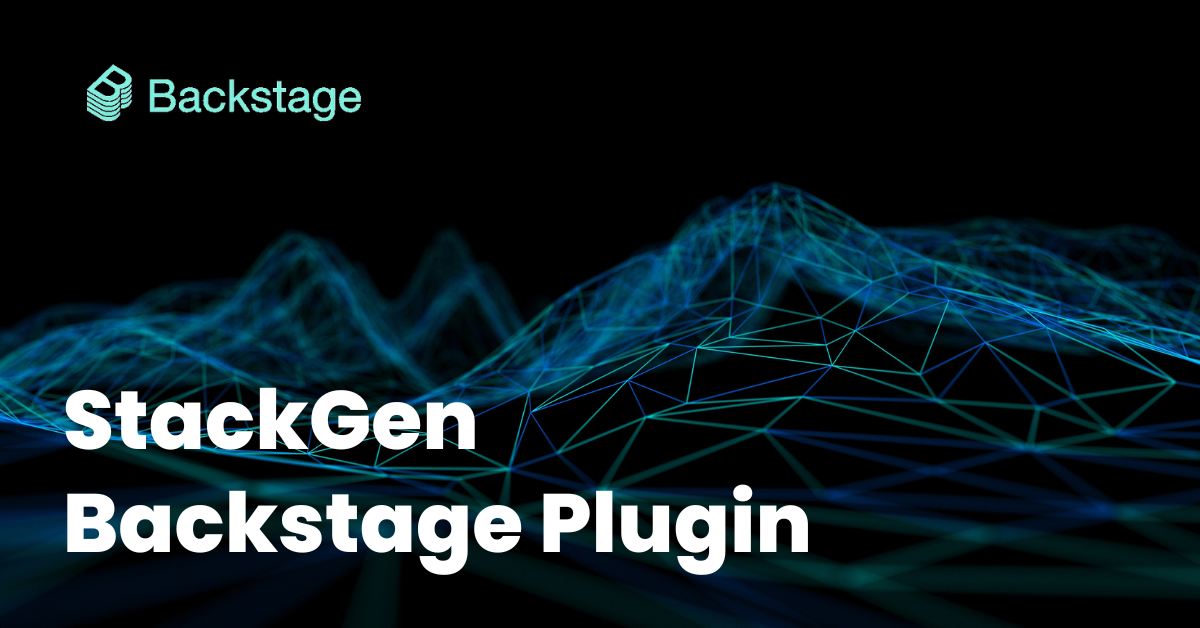PlatformCon25: Join StackGen at PlatformCon NY, the platform engineering event of the year. Register Now
Empowering Developers with Self-Service Infrastructure Through Backstage Integration

Empowering Developer Independence with Infrastructure Automation
We're excited to roll out Backstage Self-Service, a seamless way for your developers to scaffold applications and provision infrastructure, without needing to rely on DevOps teams for every infrastructure request. This integration transforms how your organization approaches infrastructure provisioning by putting the power directly into developers' hands through Backstage's familiar interface.
The Challenge: Breaking Down Infrastructure Bottlenecks
In traditional development workflows, infrastructure provisioning often becomes a bottleneck. Developers need cloud resources like S3 buckets, RDS databases, or Kubernetes deployments, but they have to wait for DevOps teams to provision these resources manually. This dependency creates delays, reduces developer velocity, and can lead to inconsistent infrastructure configurations across projects.
StackGen's Backstage Self-Service integration eliminates these bottlenecks by enabling developers to provision infrastructure through the same interface they already use for scaffolding applications.
Core Capabilities: What's Possible with StackGen Self-Service?
With StackGen self-service integrated into Backstage, your developers can:
- Scaffold backend and frontend applications with integrated infrastructure
- Templatize most commonly used infra to create appstacks.
- Generate and export Infrastructure as Code (IaC) automatically
- Provision cloud resources like AWS S3, RDS, and more through simple forms
Advanced Features:
- Deploy Helm workloads with nested configurations
- Create custom resource packs common infrastructure patterns
- Configure complex resource groups with parent-child relationships
- Maintain consistency across environments through template standardization
How StackGen Transforms Backstage's System Model
Backstage's software templates traditionally focus on code scaffolding. StackGen extends this model by seamlessly integrating infrastructure provisioning into the same workflow. Here's how it works:
1. Enhanced Template Structure: StackGen introduces the stackGen:createAppstack action that works alongside Backstage's existing template system. Your templates can now include infrastructure specifications right alongside application code:

2. Unified Developer Experience
Developers interact with a single interface to provision both applications and infrastructure. The familiar Backstage template form now includes infrastructure parameters, making the entire process intuitive and consistent.
3. Automated Infrastructure as Code Generation
Once resources are defined through the template, StackGen automatically generates the corresponding Infrastructure as Code (IaC), ensuring that your infrastructure is version-controlled and reproducible.
Real-World Implementation Example
Let's examine a practical scenario where a development team needs to create a new microservice with supporting cloud infrastructure:
Traditional Approach:
- Developer creates application code.
- Submits infrastructure request to DevOps.
- Waits for S3 bucket, RDS database, and load balancer provisioning.
- Manually configures application to connect to infrastructure.
- Deploys application after infrastructure is ready.
With StackGen Self-Service:
- Developer fills out single Backstage template form.
- Developers get both scaffolded applications (via Backstage) and provisioned infrastructure (via StackGen) from one unified template experience.
- Infrastructure as Code is automatically generated and stored.
- Application is deployed with pre-configured infrastructure connections.
- Complete environment is ready in minutes, not days.
 IMAGE:Create appStack from self-service template
IMAGE:Create appStack from self-service template
 IMAGE: View the created appStack using the generated link
IMAGE: View the created appStack using the generated link
 IMAGE: appStack in StackGen
IMAGE: appStack in StackGen
Advanced Configuration Capabilities
Resource Packs for Standardization
StackGen supports resource packs—pre-configured bundles of related infrastructure components that ensure consistency across your organization:

Nested Resource Groups
Note: At present, you can create a nested resource group only for Helm resources.
Complex applications often require related infrastructure components. StackGen handles this through nested resource configurations:

 IMAGE: StackGen Topology canvas showing provisioned resources
IMAGE: StackGen Topology canvas showing provisioned resources
Integration Benefits for Your Organization
For Developers
- Faster Time to Market: No waiting for infrastructure provisioning
- Consistent Environments: Standardized templates ensure uniformity
- Self-Service Independence: Reduced dependency on DevOps teams
- Familiar Interface: Leverage existing Backstage knowledge
For DevOps Teams
- Reduced Operational Overhead: Fewer manual provisioning requests
- Standardization at Scale: Templates enforce best practices automatically
- Infrastructure as Code by Default: All resources are version-controlled
- Audit Trail: Complete visibility into resource provisioning
For Enterprises
- Improved Developer Velocity: Faster feature delivery and iteration
- Cost Optimization: Standardized templates prevent resource sprawl
- Security Compliance: Templates can embed security best practices
- Scalable Operations: Self-service scales with team growth
Getting Started with StackGen Self-Service
Setting up StackGen's Backstage integration requires configuration:
- Add StackGen Configuration to your app-config.yaml
- Install StackGen plugin in your backend.
- Create Templates that leverage StackGen's infrastructure capabilities
- Enable Developer Access through Backstage's standard permission model
The integration leverages StackGen's robust API to validate configurations, provision resources, and return deployment URLs directly within the Backstage interface.
The Future of Self-Service Infrastructure
StackGen's Backstage Self-Service represents a fundamental shift toward developer-centric infrastructure management. By removing traditional barriers between application development and infrastructure provisioning, we're enabling organizations to move faster while maintaining operational excellence.
This integration exemplifies how modern development platforms should work—providing developers with the tools they need to be productive while ensuring that infrastructure remains consistent, secure, and manageable at scale.
Ready to empower your developers with self-service infrastructure? StackGen's Backstage Self-Service is available on request. Contact our team at support@stackgen.com to learn how you can eliminate infrastructure bottlenecks and accelerate your development workflows.
Transform your developer experience today with StackGen's seamless Backstage integration.
Read Also: StackGen’s Generative Infrastructure as Code: Future of Cloud Provisioning


